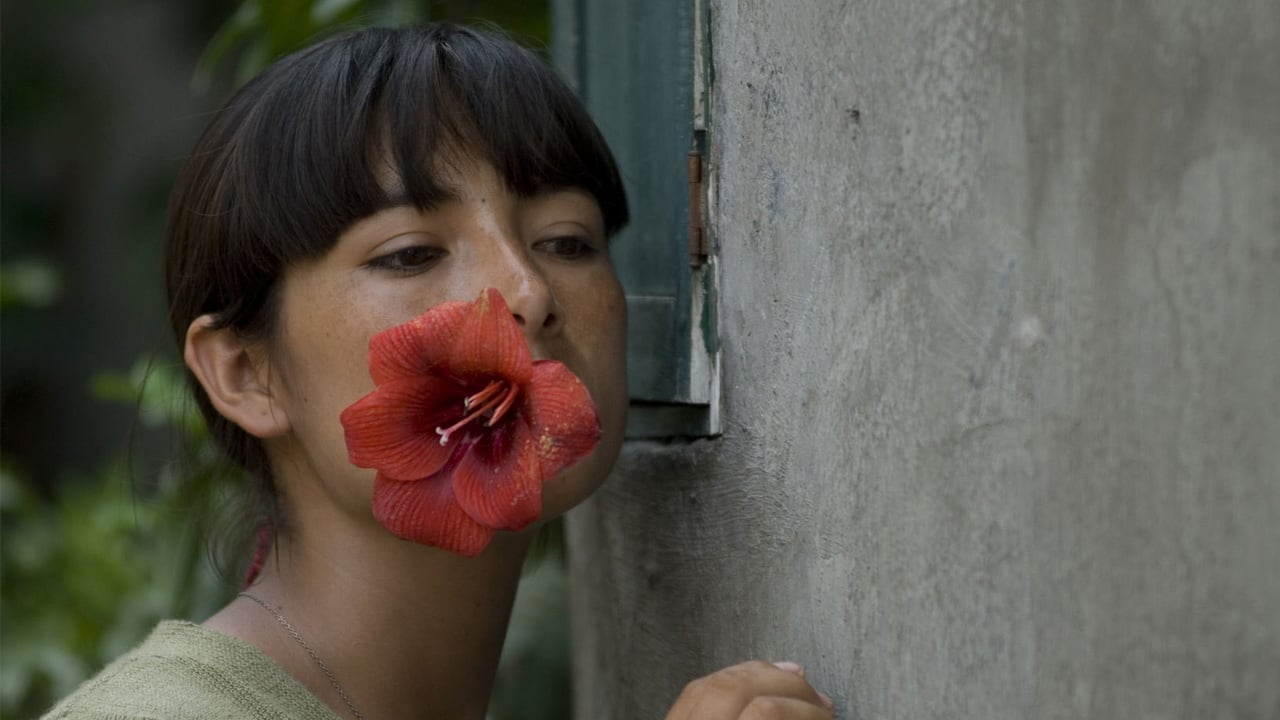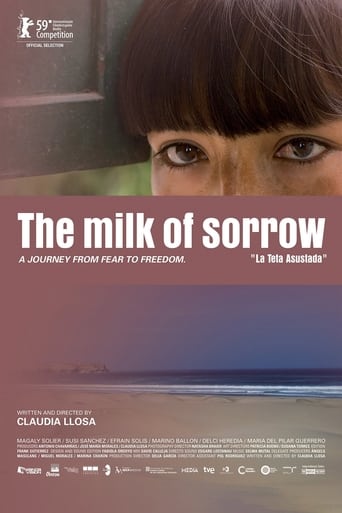

La teta asustada is no action-packed thriller by any stretch of the imagination. But it is an emotional documentation of the saddening story of Fausta, an indigenous Peruvian woman who lives with her mother next to her aunt, uncle, and cousins.Throughout the movie, Fausta is subjected to a multitude of hardships, beginning with the death of her mother. The film begins with a somber song sung by Fausta mother that recounts her rape and contraception of Fausta during the time of terrorism in the hillcountry of Peru. Because Fausta's mother lived during this time, it was believed by the people in their village that Fausta was contaminated with the disease "la teta asustada," or "the milk of sorrow." The disease affected those who were nursed by women affected by the horrific events during that often-forgotten time in Peruvian history.While Fausta's believed diagnosis of "la teta asustada" is the cause for a lot discrimination against her, we also see the difference in rich and poor culture when she begins working for wealthy family in the city. Her relationship with the woman for whom she is working is strained and often times uncomfortable, but she finds solace in her relationship with the gardener. A speaker of her native Quechua, the gardener provides a needed sense of home in the bigger city, where she feels very out of place and at many times antagonized. This feeling ultimately culminates in Fausta's boss letting her go on the side of street after they attended a show in Lima where the woman performed one of Fausta's songs. We ultimately see many intersections of culture in Fausta throughout the movie. Almost all of which resulting in some form of criticism or hardship. This aggregation of misjustice is accentuated by the melancholy tone of the film, as well as the overall theme presented.
... View MoreFausta, the main character of "La teta asustada", has the disadvantages of being a woman, an Indian, and poor, in a society that in its essence is not too different from others in any corner of the world, no matter what the intelligentsia or UNESCO may say about social, economic, ethnic or gender vindication in the past century. Fastua's mother raised her according to quechua tradition and convinced her that she was infected with a disease called "the frightened tit", as a result of the mother being raped while carrying Fausta in her womb, and because she fed Fausta with her poisonous milk. Although she is very beautiful, the young Fausta has grown into a men-hating, always frightened, and laconic woman. She is also sick, because she has found a most revolting way to avoid rape. In part, the fact that Claudia Llosa belongs to the privileged, white (or not-Indian) sector of Peruvian society, works against her work, and a few of the incidences seem too foreign to her appreciation. Luckily, she slowly develops the story in settings and circumstances that do not seem completely real. Although based on facts, much of the action belongs to the realm of fantasy. You don't have to be a woman, an Indian or poor to appreciate this film (though it would help). It just takes a bit of sensibility and compassion. A good, necessary film.
... View MoreFausta Isidora (Magaly Solier) is a weird young woman that lives permanently scared in a poor community in Lima. Her mother was raped by many men when she was pregnant of Fausta, and raised her daughter with a morbid fear of men. When her mother dies, Fausta has a bleeding and faints. Her uncle takes her to the doctor that finds that she keeps a potato inside her vagina to protect her against intercourse. Her uncle tells to the doctor that in accordance with the lore of the locals, she has a disease called "La Teta Assustada" (meaning "The Frightened Teat" in English) transmitted by the milk of an abused pregnant woman. Fausta decides to bury her mother in her home village, but neither she nor her uncle has the necessary amount for the coffin and the transportation. Fausta starts working as housemaid in the manor of a pianist to raise the necessary money; she befriends the gardener that helps her and Fausta finally resolves her issues. "La Teta Assustada" is an exotic but boring and unpleasant low budget movie. The story is developed in slow-pace and probably will please viewers of the First World that maybe have never seen a slum and poor people like the dweller of Fausta's community. Magaly Solier has a great performance and her exotic beauty is impressive. The translation of the title of this film to English ("The Milk of Sorrow") is ridiculous since the correct translation would be "The Frightened Teat". The summary in IMDb from Pusan International Film Festival is ridiculous and the author has certainly not understood the story; or maybe the translation from Spanish was wrong. My vote is six.Title (Brazil): "A Teta Assustada" ("The Frightened Teat")
... View MoreClaudia Llosa's drama The Milk Of Sorrow is an award winning film that has toured the festival circuit and was also Peru's entry for the 2010 Foreign Language Oscar. The central character here is Fausta (played by Magaly Solier), who has grown up hearing her mother's horror stories about rape and the atrocities committed curing the violent 1980's in her native Peru. Traumatised and sexually repressed, she plants a potato in her vagina, which is meant to ward off potential rapists. Fausta has been suckled on "the milk of sorrow", which basically means that the horrors endured by her mother whilst Fausta was in the womb have been transmitted on to her through breast milk. When her mother dies, Fausta has to try and raise some money in order to transport the body back to her home village and pay for the funeral. She lands a job as a maid to the imperious and emotionally stolid Mrs Aida (Susi Sanchez), a singer preparing for a concert. The dark and eerie home on the outskirts of the city is symbolic of Mrs Aida's own sterile and empty life. When the woman hears the shy Fausta sing, she offers her pearls from one of her necklaces in exchange for the occasional song. Fausta also strikes up a friendship with the gardener Noe (Efrain Solis), who shares his passion for flowers with her. The garden is a metaphor for growth and freedom, and becomes hugely symbolic as Fausta slowly begins to reconnect with the world and discovers that even the most withdrawn and traumatised of women can flourish. The Milk Of Sorrow is the second film from director Llosa, and she handles the material with restraint. Llosa draws a strong and surprising contrast between the humour and beauty of life in the slums and the fear and isolation that permeate life in the city. The film also offers some insights into the culture, traditions and superstitions of village life in contemporary Peru. Peru's recent history of violence, particularly under the Shining Path, and war inform this contemporary drama, and the events of the past cast a muted shadow over the events. Even though these horrors are a distant memory for most they still resonate strongly for many of the characters here. Solier, who also appeared in the director's first film Madeinusa, gives an understated performance as Fausta. Natasha Baiers' cinematography is beautiful, and Selma Mutais' haunting music score enriches the film. However, the film is languidly paced, and its slow pace means that many in the audience will fail to connect emotionally with Fausta's journey. It is easy for audiences to somehow remain detached from the whole thing.
... View More